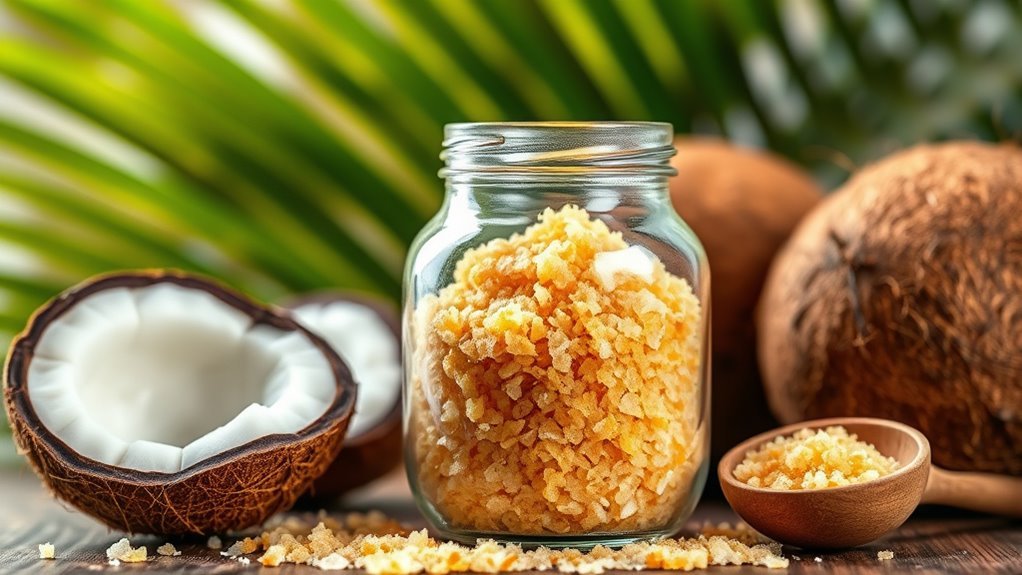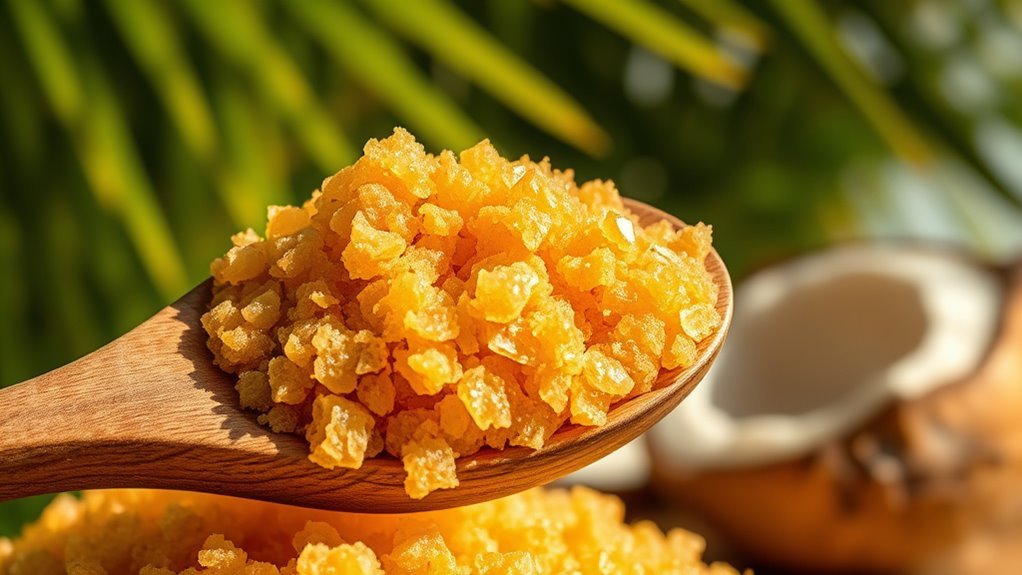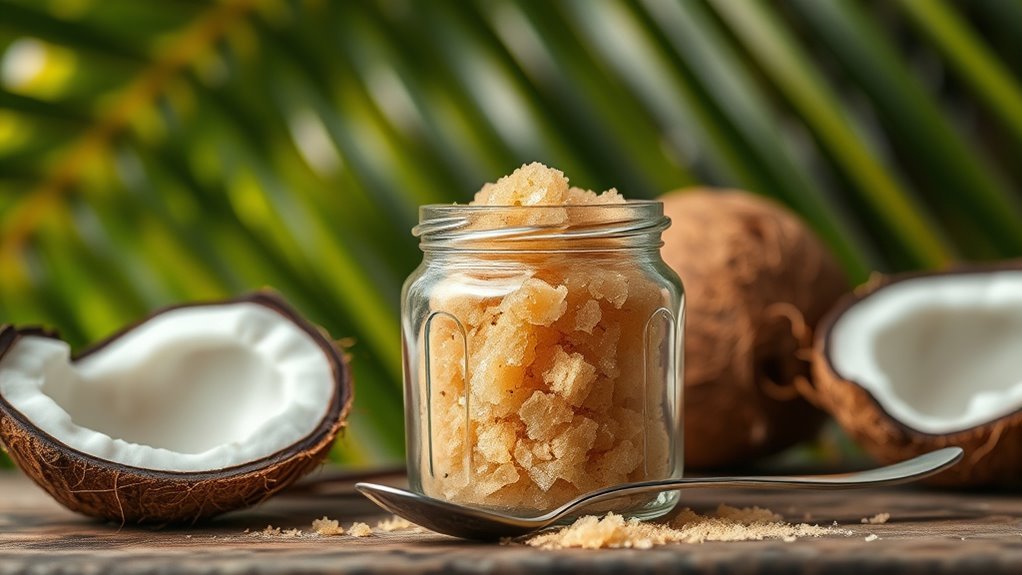Coconut sugar isn’t ideal for a keto diet due to its carbohydrate content and glycemic index. With a GI of around 54, it can raise your blood sugar levels, potentially disrupting ketosis. While it has a lower GI than refined sugar, it’s still composed of 70-80% sucrose, which can impact your carb intake. If you want to find out more about sweetener options that align with keto, there are better alternatives to evaluate.
Understanding Coconut Sugar

Coconut sugar, often hailed as a natural sweetener, is derived from the sap of coconut palm flowers. Its origins trace back to Southeast Asia, where traditional methods have been used for centuries. The production process involves collecting the sap, then heating it to evaporate moisture, resulting in granulated sugar. This method preserves many nutrients and gives coconut sugar its distinct caramel flavor. Unlike refined sugars, coconut sugar boasts a lower glycemic index, making it a popular alternative for those seeking a more natural sweetening option. However, it’s crucial to evaluate its sugar content, especially if you’re following a low-carb or ketogenic diet. Understanding coconut sugar’s origins and production can help you make informed choices about its use in your diet.
Nutritional Profile of Coconut Sugar

While many people turn to coconut sugar as a healthier sweetener, it’s important to examine its nutritional profile to determine how it fits into your diet. Coconut sugar contains about 15 calories per teaspoon and is primarily composed of carbohydrates, mostly in the form of sugar. It also offers trace amounts of vitamins and minerals, including potassium, magnesium, and zinc, which can provide some nutritional benefits. However, despite these minerals, coconut sugar is still sugar and can impact your overall carbohydrate intake. If you’re following a keto lifestyle, it’s essential to reflect on how coconut sugar might affect your daily macros. Balancing enjoyment of this sweetener with its nutritional content can help you make informed choices.
Glycemic Index and Its Importance

The glycemic index (GI) measures how quickly a carbohydrate-containing food raises your blood sugar levels. Understanding the GI is essential, especially if you’re managing diabetes or following a keto diet, as it can impact your energy levels and cravings. By knowing the GI of foods like coconut sugar, you can make more informed dietary choices.
Glycemic Index Defined
Understanding the glycemic index (GI) is essential for anyone monitoring their carbohydrate intake, especially on a ketogenic diet. The glycemic index measures how quickly foods raise blood sugar levels after consumption. Foods with a high GI can lead to rapid spikes in blood sugar, which isn’t ideal for those aiming for stable energy levels and fat-burning. On the other hand, low-GI foods provide a more gradual increase in blood sugar, helping you maintain steady energy throughout the day. Knowing the GI of foods can empower you to make informed choices that align with your dietary goals. It’s not just about cutting carbs; it’s also about understanding how different foods impact your body’s response to carbohydrates.
Impact on Blood Sugar
Knowing how different foods affect blood sugar is critical, especially when considering sweeteners like coconut sugar. While it’s often marketed as a healthier alternative, coconut sugar has a glycemic index of around 54, which means it can still cause a notable insulin response. This can lead to spikes in blood sugar, which isn’t ideal for those following a ketogenic diet or anyone looking to maintain stable energy levels. If you’re aiming for freedom in your dietary choices, it’s important to weigh the impact of coconut sugar on your overall blood sugar management. By understanding these effects, you can make informed decisions that align with your health goals without sacrificing enjoyment in your meals.
How Coconut Sugar Affects Ketosis
While you might be drawn to coconut sugar as a natural sweetener, it’s essential to reflect on how it impacts ketosis. Coconut sugar contains fructose and glucose, which can affect sugar metabolism in your body. When you’re in ketosis, your body relies on fat for energy instead of carbohydrates. Consuming coconut sugar can disrupt this state, as it raises blood sugar levels, potentially leading to ketosis effects that hinder your goals. Even though it offers a lower glycemic index than regular sugar, it still introduces carbohydrates that can knock you out of ketosis. If you’re committed to maintaining your ketogenic lifestyle, it’s vital to evaluate how coconut sugar fits into your overall carb intake and its potential to impact your progress.
Comparing Coconut Sugar to Other Sweeteners
When considering sweeteners on a ketogenic diet, it’s helpful to compare coconut sugar with other options. Coconut sugar contains about 70-80% sucrose, which can spike your blood sugar levels. In contrast, stevia and erythritol are popular coconut sugar alternatives that have little to no effect on blood glucose, making them more suitable for keto dieters. Monk fruit is another option that offers sweetness without the carbs. When doing a sweetener comparison, remember that while coconut sugar might be more natural, it still poses challenges for maintaining ketosis. Ultimately, your choice should align with your dietary goals, so weigh the pros and cons of each sweetener to find what best fits your lifestyle.
Incorporating Coconut Sugar Into a Keto Diet
Although coconut sugar can be appealing due to its natural origin and lower glycemic index compared to refined sugar, incorporating it into a keto diet requires careful consideration. You’ll want to be mindful of its carbohydrate content, as it can impact your ketosis. Instead, consider coconut sugar alternatives that are lower in carbs, like erythritol or stevia.
Here’s a quick comparison to help you choose:
| Sweetener | Carbs per 1 Tbsp | Keto Friendly |
|---|---|---|
| Coconut Sugar | 12g | No |
| Erythritol | 0g | Yes |
| Stevia | 0g | Yes |
You can still enjoy keto-friendly recipes by substituting these alternatives for coconut sugar, allowing your taste buds to thrive while staying on track.
Final Thoughts on Coconut Sugar and Keto
Ultimately, if you’re following a keto diet, it’s crucial to understand the implications of using coconut sugar. While it’s often marketed as a healthier option, coconut sugar still contains carbohydrates that can hinder your progress on keto. If you’re looking for alternatives, consider keto-friendly sweeteners like stevia, erythritol, or monk fruit, which have little to no impact on your blood sugar levels. These options provide sweet flavors without the carbs, allowing you to satisfy your cravings without derailing your diet. Remember, the freedom to choose what you eat comes with responsibility. Weigh the benefits and drawbacks of coconut sugar against other coconut sugar alternatives, and make an informed decision that aligns with your keto goals.
Is coconut sugar keto-friendly?
Coconut sugar is not considered keto-friendly. While it is a natural sweetener and has a lower glycemic index compared to regular sugar, it still contains carbohydrates that can hinder ketosis. On a strict ketogenic diet, it’s typically recommended to limit carbohydrate intake to around 20-50 grams per day, and coconut sugar contains approximately 13 grams of carbohydrates per tablespoon, which can quickly add up.
What are the nutritional benefits of coconut sugar?
Coconut sugar contains trace amounts of nutrients such as iron, zinc, calcium, and potassium. It also has inulin, a type of soluble fiber that may help slow glucose absorption. However, while these nutrients can be beneficial, they are present in such small amounts that they do not significantly contribute to your daily nutritional needs, especially when considering a keto diet.
Can I use coconut sugar in small amounts on a keto diet?
While it is possible to use coconut sugar in very small amounts while following a keto diet, it’s essential to be cautious. Even small quantities contribute to your daily carbohydrate allowance. If you choose to use coconut sugar, consider measuring it carefully and being mindful of how it fits into your overall carb intake for the day to avoid disrupting ketosis.
What are some keto-friendly alternatives to coconut sugar?
There are several keto-friendly alternatives to coconut sugar, including erythritol, monk fruit sweetener, and stevia. These sweeteners are low in carbohydrates and have little to no impact on blood sugar levels, making them suitable for a ketogenic diet. Always check the packaging for carb content and serving sizes to ensure they align with your dietary goals.
Does coconut sugar affect blood sugar levels?
Yes, coconut sugar can affect blood sugar levels, although it has a lower glycemic index compared to regular table sugar. The glycemic index of coconut sugar is around 54, which means it can still cause a rise in blood sugar levels when consumed. For individuals managing diabetes or those on a ketogenic diet, it’s essential to be mindful of how coconut sugar fits into your overall carbohydrate and sugar intake.
References
- https://www.healthline.com/nutrition/coconut-sugar-keto
- https://www.thoughtco.com/coconut-sugar-nutrition-facts-4175758
- https://www.medicalnewstoday.com/articles/324056
- https://www.ncbi.nlm.nih.gov/pmc/articles/PMC5640647/
- https://www.webmd.com/diet/coconut-sugar-what-to-know
- https://www.mayoclinic.org/healthy-lifestyle/nutrition-and-healthy-eating/expert-answers/coconut-sugar/faq-20057783
- https://www.verywellfit.com/coconut-sugar-nutrition-facts-5186087
- https://www.nutrition.gov/
- https://www.cdc.gov/nutrition/index.html


